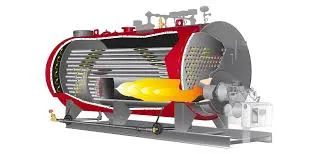
أكتوبر . 05, 2024 16:51 Back to list
steam boiler vs steam generator
Steam Boiler vs. Steam Generator Understanding the Differences and Applications
The world of industrial steam systems is vast and intricate, primarily revolving around two key players steam boilers and steam generators. While the terms are often used interchangeably, they refer to distinct technologies with different operational principles, applications, and efficiencies. This article aims to dissect these two systems, highlighting their characteristics, advantages, and ideal use cases.
What is a Steam Boiler?
A steam boiler is a closed vessel used to create steam by applying heat energy to water. It channels fuel combustion or electricity to produce steam, which can then be harnessed for diverse applications, including power generation, heating, and manufacturing processes. Steam boilers can be classified into two main categories fire-tube and water-tube boilers.
In a fire-tube boiler, hot gases from combustion pass through tubes that are surrounded by water, transferring heat to the water and producing steam. Conversely, in a water-tube boiler, water flows through tubes that are heated by combustion gases. Fire-tube boilers are typically used for smaller steam applications, whereas water-tube boilers cater to larger scales due to their ability to produce high-pressure steam efficiently.
What is a Steam Generator?
A steam generator, often referred to as a steam generator boiler, is a type of boiler but with a more specific function and design. It produces steam at low to moderate pressures but operates without a steam drum, which is a defining feature of traditional steam boilers. Instead, it integrates heat exchangers and generates steam on-demand. The design usually emphasizes compactness and rapid steam generation.
Steam generators serve different purposes compared to traditional boilers. They are often used in applications requiring quick heat turnover or when space is restricted. Industries like food processing, pharmaceutical, and some power generation operations prefer steam generators due to their efficient, low-capacity steam production.
steam boiler vs steam generator

Key Differences between Steam Boilers and Steam Generators
1. Design and Construction Steam boilers generally feature larger structures with either fire-tube or water-tube designs. They are built to handle substantial quantities of water and high pressures, which makes them suitable for large-scale industrial applications. In contrast, steam generators are typically more compact, designed to generate steam rapidly and are ideal for smaller-scale operations.
2. Steam Production and Efficiency Steam boilers can generate steam continuously and sustain higher pressures and volumes. They are built for efficiency over extended periods of operation. Steam generators are more flexible for short bursts of steam production and are designed to handle quick response times rather than continuous load.
3. Applications Boilers are primarily used in heavy industries such as power generation, oil refining, and large manufacturing setups where significant steam production is necessary. Steam generators find their niche in applications that require quick steam production, such as food and beverage operations, HVAC systems, or specialty processes in laboratories.
4. Operational Costs Due to their construction and operational capacity, steam boilers may have higher initial costs and maintenance requirements compared to steam generators. However, steam boilers can also lead to lower costs in high-demand scenarios due to their capability to operate continually over extended periods. Steam generators may be less costly upfront but may incur higher operational costs if used outside their intended design specifications.
5. Safety and Control Steam boilers have robust safety mechanisms due to their ability to generate high pressure, necessitating careful control and monitoring systems to avoid accidents. Steam generators, with their lower pressure outputs, simplify these safety measures but require precise controls to manage rapid steam production efficiently.
Conclusion
In summary, both steam boilers and steam generators play vital roles in industrial operations, yet they cater to different needs and applications. Understanding their fundamental differences is crucial for engineers and decision-makers in selecting the right system for their specific needs. While steam boilers excel in heavy-duty applications, steam generators are perfect for scenarios requiring flexibility and quick steam generation. Ultimately, the choice between a steam boiler and a steam generator should be guided by considerations of operational efficiency, space, steam demand, and cost implications.
-
Best Steam Boiler Design PDF Free Design Calculation & Diagram Downloads
NewsJun.10,2025
-
Hot Boiler Water Heater Efficient Heating Solutions for Home & Commercial Use
NewsJun.10,2025
-
Steam Boiler Safety Devices High-Quality Protection Valves
NewsJun.10,2025
-
Ultimate Steam Boiler Checklist for Safety & Efficiency
NewsJun.10,2025
-
Optimal Hot Water Boiler Temperature Setting Guide
NewsJun.10,2025
-
Effective Hot Water Boiler Chemical Treatment Protect & Maintain
NewsJun.09,2025
Related PRODUCTS






















